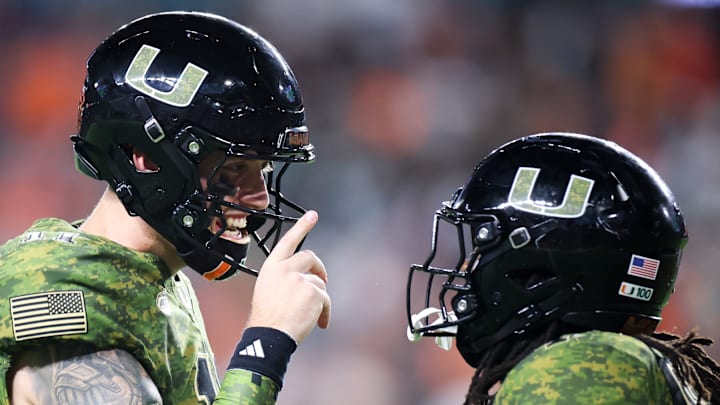With No. 10 Miami headed to SMU on Saturday (noon ET, ESPN), the one trend Mario Cristobal's team can't carry to Dallas is the periodic slow start. It showed up against Stanford and, more costly, in the loss to Louisville. When Miami starts on time, it looks like a College Football Playoff contender. When it doesn't, it invites trouble.
Miami vs Stanford, UF and Louisville
The Stanford tape is the freshest example of this. Miami was shut out in the first quarter and needed a 15-play drive inside the final 90 seconds of the half to pull even at 7-7. Only then did the Hurricanes bury the Cardinal with a 21–0 third quarter on the way to a 42-7 win. That uneven play — dormant early, dominant late — won't travel as easily against better opponents.
Florida was a different version of the same story. Miami led 13-0 at halftime but left points on the field (two second-quarter field goals) and allowed the Gators to make it a one-score game at 13-7 late in the third before closing 26-7. The defense was suffocating in that game so the Gators never really had a chance, but the opening-half offense needed to be better. If Florida wasn't going through so much turmoil this season, maybe it would have been a closer ball game.
Louisville is the cautionary tale here. The Cardinals punched first — 14-0 before the game was five minutes old — and never trailed in the contest. Miami played uphill all night and turned it over four times with Carson Beck throwing four interceptions in the 24-21 defeat. The Canes' defense tightened in the final three quarters — and by no means is that loss on them — but it was a bad showing for the entire squad in the opening quarter of that matchup. Miami started so slow in the game against Louisville that describing the Hurricanes performance as a "slow start" might even be generous.
Miami vs Notre Dame, USF and FSU
By contrast, Miami didn't stumble out of the blocks against Notre Dame, Florida State or USF — even if the finishes got unnecessarily tight in two of those. After a scoreless first quarter versus Notre Dame, the Hurricanes led 21-7 after three before holding on 27-24 as the Irish scored 17 in the fourth. At Florida State, Miami built a 28-3 cushion through three quarters before the Seminoles piled up 19 in the fourth to make it 28-22. Against USF, Miami raced to 14 first-quarter points and never looked back, 49-12. That win over USF is perhaps Miami's most complete game against an FBS opponent this season.
The bottom line for those games: the opening part matters, and letting teams back into games late is the secondary concern.
Why it matters this week: SMU's first-half offense and home-field advantage in an early kick can flip the game. If Miami isn't careful, they could find themselves playing from behind, and SMU is a lot better than Stanford.
Honorable mention worry: quarterback volatility
It wouldn't be responsible if Beck's turnover history wasn't mentioned. After all, that's really what hurt Miami against Louisville, and it was probably the biggest reason why they weren't able to come back and win. Beck’s ceiling is obvious — 4 TD passes at Florida State and 340 yards with three scores against USF — and the baseline has been efficient more often than not (2 TD, 0 INT vs. Notre Dame; 21-of-28 in the Stanford win). But the four-pick night against Louisville is a reminder that a bad quarter is difficult to overcome for any team. He enters SMU with 1,600-plus passing yards, a positive TD-INT split and a top-20 QBR, yet trimming the outlier mistakes is a must so Miami can win out.
